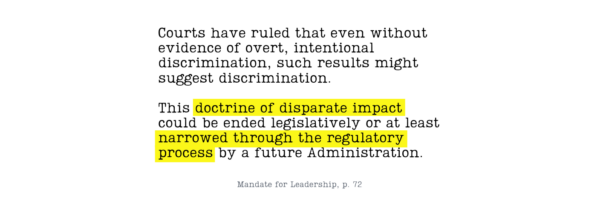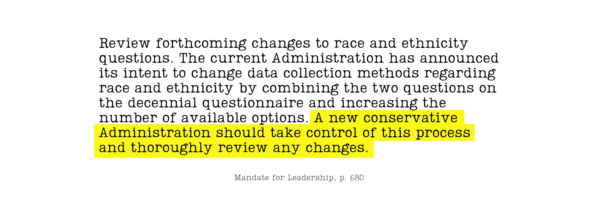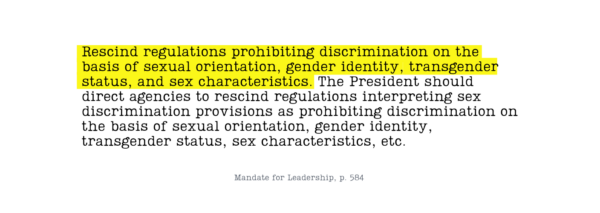Enable Discrimination Across Society:
Threatened by decades of progress in advancing civil rights and equality for all, the authors of Project 2025 want to create a country that allows for more discrimination where we live, study, work, and play — and roll back hard-fought victories by our movements for progress.
How they’d do it:

Embolden racial discrimination in everything from housing to education to employment.
Project 2025 proposes that the president should remove a key tool that the federal government uses to enforce civil rights protections.
Read More 1Project 2025 proposes that the federal government stop the long-standing use of “disparate impact” in assessing discrimination by ending its use in discrimination cases and even bringing lawsuits that challenge the standard’s constitutionality.
The disparate impact standard has long been used in determining discrimination, under Title VI and Title VII of the Civil Rights Act of 1964 and the Fair Housing Act of 1968. It is important for evaluating when ‘facially neutral’ programs have disparate impacts on certain groups of people. The Civil Rights Division of the DOJ determines disparate impact as, “does the adverse effect of the policy or practice fall disproportionately on a race, color, or national origin group?”
This standard provides an important remedy for DOJ and others to bring civil rights cases when groups of people have their civil rights violated in areas such as employment discrimination and fair housing, so discontinuing its use will make it harder for the federal government to enforce civil rights protections in everything from housing to education to employment.
Disparate impact standards have long been ruled constitutional by the United States Supreme Court, so Project 2025’s attempts are baseless.
From page 583 of the Mandate for Leadership, as well as page 72:

Make it harder for historically under-resourced communities to access Medicaid, Head Start, and other government programs.
Population counts can be essential to groups receiving appropriations and resources from the federal government like Medicaid, Head Start, community mental health programs, and much more — so Project 2025’s plans to undercount or undermine the accuracy of these counts would hurt communities that have been economically marginalized.
Read More 2The special interests behind Project 2025 want to reverse the longstanding body of work by civil rights activists who have encouraged the federal government to collect more sophisticated data when it comes to racial and ethnic groups, which has helped ensure communities that have been historically under-resourced because of their racial demographics receive proper allocations of resources.
As recently as March 2024, the Biden administration issued a revision to Statistical Directive No.15, which governs “standards for maintaining, collecting, and presenting federal data on race and ethnicity.” The revision is for more accurate and useful race and ethnicity data collection across various agencies of the U.S. federal government.
Project 2025 would advise a future administration to hamstring these revisions by instructing the White House Office of Management and Budget to reverse them and ensure that other federal agencies are not aiding in the collection of more accurate data. This would leave historically underrepresented communities at a disadvantage when it comes to accessing critical programs we rely on every day — from Medicaid to Head Start.
From page 680 of the Mandate for Leadership:

Undermine gender equity across the government.
Project 2025 would eliminate the White House Gender Policy Council, which is key to promoting contraception access, gender-based violence prevention, and women’s health equity.
Read More 3Under the Biden administration, the White House Gender Policy Council has led efforts to increase access to contraception, published the National Plan to End Gender-Based Violence, and begun groundbreaking research into how women’s health is studied across the country. Project 2025 would immediately disband the Council and prioritize coordinating efforts that push for “promoting life” and emphasize a narrow vision of what defines a “family.”
From page 62 of the Mandate for Leadership.
Allow more discrimination against LGBTQ+ youth in adoption and foster care agencies.
Project 2025 would make it easier for state and child welfare agencies — which are charged by the public to provide appropriate care for children — to cite religious exemptions as a way to promote bigotry.
Read More 4In 2022, more than 368,000 children were enrolled in foster care in the U.S. Project 2025 would instruct the Department of Health and Human Services to repeal a 2016 regulation that provides additional protections for foster youth, related to sexual orientation and gender identity.
Enabling adoption and foster care agencies to subject vulnerable children to the whims of extreme religious beliefs would be detrimental to the physical, mental, and emotional health of fostered/adopted youth, especially LGBTQ+ youth, who are already dealing with intense adversities.
From page 477 of the Mandate for Leadership.
Put Black communities and others that have historically borne the brunt of health impacts from pollution and other environmental harms at increased risk.
Project 2025 proposes to eliminate the EPA’s Office of Environmental Justice and External Civil Rights.
Read More 5EPA’s newly-created Office of Environmental Justice and External Civil Rights is the agency’s dedicated office for ensuring that environmental and public health policies are crafted and implemented in ways that ensure no communities are left behind or disproportionately harmed.
Eliminating this office would put the communities that have historically borne the brunt of harms from pollution, climate change, and other hazards — which are too often Black and brown communities — at increased risk.
From page 421 of the Mandate for Leadership.
Enable discrimination based on sexual orientation and gender identity.
By misinterpreting Supreme Court precedent and allowing more religious exemptions, Project 2025 would roll back protections against discrimination against LGBTQ+ people and others in the workplace.
Read More 6LGBTQ+ Americans have had to fight for protections under the law and in recent years we have witnessed important gains, including the Supreme Court’s confirmation of federal protections in the workplace, which logically extend to other areas like health care and schools. Yet, Project 2025 wants to reverse this progress.
Project 2025 plans to restrict the application of a critical 2020 Supreme Court case called Bostock v. Clayton County that assures workplace protections for LGBTQ+ people through making clear that discrimination against LGBTQ+ people is a form of sex discrimination prohibited by our federal civil rights laws. Project 2025 would try to enable greater workplace discrimination through allowing employers to impose their religious or moral beliefs on their employees.
From pages 584 and 586 of the Mandate for Leadership.
Additionally, the Biden administration has helped to ensure protections from gender identity discrimination across many aspects of our lives, including “health care, housing, education, credit and lending services, and community safety programs.”
Project 2025, however, would roll back and severely limit those protections and leave already-vulnerable people at increased risk for discrimination when trying to rent an apartment, go to school, and more.
From page 584 of the Mandate for Leadership:
